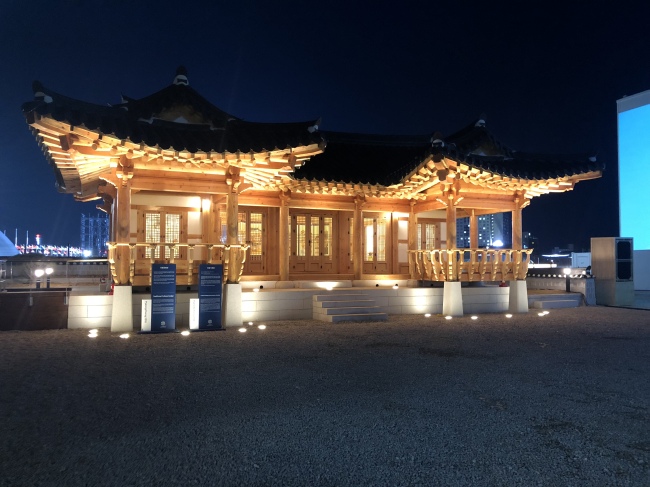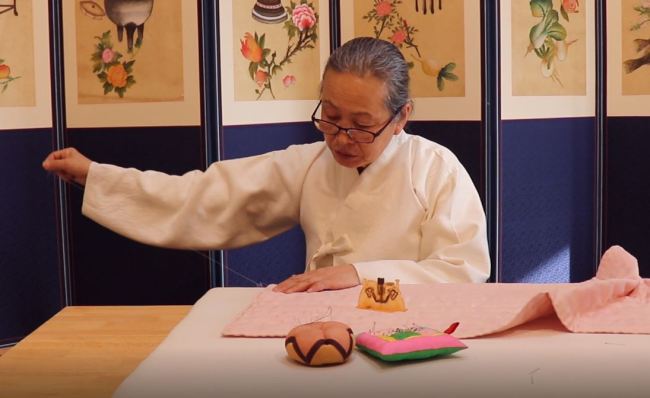[Video] PyeongChang Winter Games promote traditional Korean culture
Traditional Korean Pavilion and Traditional Experience Booth showcase the essence of Korean culture
By Park Ju-youngPublished : Feb. 11, 2018 - 16:03
For the next two weeks, the world’s best winter sports athletes will be vying for the coveted gold in the PyeongChang Winter Games. But organizers of the international event seek to take this opportunity to also promote Korea’s traditional culture through what they have dubbed “Cultural Olympiad.”
From Feb. 9 - 25, various cultural events will take place across Gangwon Province, including Olympic venues, temples, tourist spots and stations.

On a freezing Saturday afternoon, about 100 spectators encircled performers carrying out a “Pangut Performance” to traditional folk music called “Pungmulnori,” at PyeongChang Olympic Plaza Traditional Experience Outdoor Stage. Clad in traditional costumes, the musicians danced and sang along to the cheerful sounds of traditional instruments.
“We just walked in (the Olympic Plaza) and this is the first thing we saw. It looks great,” Joseph Lenox said, who visited PyeongChang for the games.
“The performers are doing good jobs, they look full of pride to be performing for us today. I think this is the type that should be promoted, rather than just K-pop. It’s much more interesting to me and it’s the kind of the things people want to see in the Olympics.”
When entering the main gate of the traditional Korean pavilion, a building of Hanok houses greets visitors, which imitates the experience of visiting Gangneung’s Seongyojang House. The venue features diverse demonstrations and performances by the prestigious Holders of Important Intangible Cultural Properties every day.

“I hope there would be a cultural Olympic games, where craftmen can compete their skills,” said quilting master Kim Hae-ja, while demonstrating her “Nubijang (Quilting)” skills. Foreign and local visitors were seen sitting on the floor and watching the masters’ quilt meticulously.
Next to the Hanok building, there is a “traditional experience booth.” With expert guides, visitors can make traditional crafts, such as calligraphy, woodprint, meal and paintings. Five museums across the country have installed their booths, featuring craft making sessions.
As the booths started to operate from Saturday, the area was packed with people who tried to experience the traditional crafting.
“We had to make a reservation board this morning due to the crowded space,” said Ko Woon-young, an official from the Chuncheon National Museum.

“Visitors can put their names on the board if they want to participate. The sessions received favorable responses among the participants so far.”
Besides the spots at PyeongChang Olympic Plaza, traditional performances and exhibitions are also taking place in Gangneung and Jinbu.
Pansori drama “Korea Shimcheong” is set to be performed at Gangneung Art Center in Feb. 21 and 22, while the cultural facility of Jinbu Station features “Korean Art and Cultural Masters Exhibition“ until March 18.
People who are interested in Korean Buddhism culture can take a night over at Woljoengsa Temple near Odae Mountain, Pyeongchang, which provides a temple stay program.
By Park Ju-young (jupark@heraldcorp.com)









![[Kim Seong-kon] Democracy and the future of South Korea](http://res.heraldm.com/phpwas/restmb_idxmake.php?idx=644&simg=/content/image/2024/04/16/20240416050802_0.jpg&u=)







![[KH Explains] Hyundai's full hybrid edge to pay off amid slow transition to pure EVs](http://res.heraldm.com/phpwas/restmb_idxmake.php?idx=652&simg=/content/image/2024/04/18/20240418050645_0.jpg&u=20240418181020)

![[Today’s K-pop] Zico drops snippet of collaboration with Jennie](http://res.heraldm.com/phpwas/restmb_idxmake.php?idx=642&simg=/content/image/2024/04/18/20240418050702_0.jpg&u=)